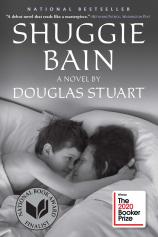Shuggie Bain
Review
Shuggie Bain
It’s hard to recall many debut novels that have achieved as much critical acclaim as SHUGGIE BAIN. After a year of being named as a finalist for the Kirkus Prize, the National Book Award, and the Center for Fiction First Novel Prize, Douglas Stuart’s book won the prestigious Booker Prize, whose judges called it “heartrending…hopeful, but it’s also desperately sad.”
Stuart sets SHUGGIE BAIN in Glasgow in the 1980s, amid the city’s working class and poor, many of whom are being unbearably squeezed by the extreme fiscal cutbacks of Margaret Thatcher’s administration. Among them are Agnes Bain and her family, including her two children from her disastrous first marriage, her second husband Big Shug (short for Hugh), and their young son Shuggie.
"SHUGGIE BAIN is, like its title character, both quiet and observant and full of energy and potential.... It is a remarkable debut that will stay with readers for a long time to come."
When we first meet Agnes, she’s living with her children and her parents in a council block of flats in Glasgow. She already has developed a significant drinking problem, both fueling and exacerbated by her husband’s infidelities and physical abuse. Her benders grow increasingly self-destructive, and she becomes convinced that she and her children need a fresh start, away from her parents. So when Big Shug tells Agnes that he’s found them a new place in Pithead, on the outskirts of the city, she’s eager for a chance to start over. However, it becomes immediately clear that Shug has no intention of joining them. Instead, he deposits Agnes and the children there and makes his way to his own new house, with his girlfriend and her family.
Agnes is an attractive woman who takes pride in her appearance and that of her children and her home. She is both envied and despised by the other women in her new neighborhood, many of whom have lost husbands to drink and despair or who have succumbed to alcoholism and depression themselves. Pithead, home to a formerly thriving mine, is just one of many neighborhoods in Glasgow ravaged by industrial decline. Soon enough, Agnes is using her weekly government allowance on drink and has become a figure of derision in her neighborhood.
Like many children of alcoholics, Shuggie becomes independent far before his time, often acting as his mother’s caretaker when she is incapacitated, making excuses for her, and serving as a mediator between Agnes and his older brother, Leek. Agnes’ daughter flees halfway around the world as soon as she’s old enough to marry. Shuggie’s position in the family and in the community is complicated by his growing awareness that he’s different from other boys. The rampant homophobia of his working-class neighborhood in the 1980s means that he’s afraid to interrogate or acknowledge his own sexuality.
SHUGGIE BAIN offers readers two kinds of equally fascinating and troubling portraits. The first is of a city at a particular moment in its history, at a time when (as Shug remarks as he drives his taxi around town) “The city was changing; you could see it in people’s faces. Glasgow was losing its purpose, and he could see it all clearly from behind the glass…” Stuart brilliantly portrays the city through its neighborhoods and glimpses at its inhabitants, small moments that speak volumes.
And, of course, the novel is also a portrait in miniature, of the intimate tragedies of one of those desperate 1980s Glasgow families. The chronicle of Agnes’ alcoholism and its effect on her family is remarkable for being simultaneously brutal and tender, with no real victims or villains on any side. Throughout, Shuggie and his siblings --- and even Agnes herself --- wrestle with what they owe one another. Near the novel’s end, Leek advises, “Don’t make the same mistake as me. She’s never going to get better. When the time is right you have to leave. The only thing you can save is yourself.”
SHUGGIE BAIN is, like its title character, both quiet and observant and full of energy and potential. In the end, Stuart even manages to wring more than a little hope out of a landscape of despair. It is a remarkable debut that will stay with readers for a long time to come.
Reviewed by Norah Piehl on December 18, 2020
Shuggie Bain
- Publication Date: October 13, 2020
- Genres: Fiction
- Paperback: 448 pages
- Publisher: Grove Press
- ISBN-10: 0802148506
- ISBN-13: 9780802148506




